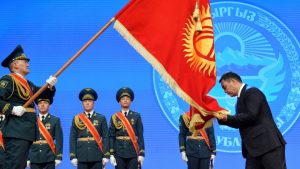In mid-September, the International Republican Institute (IRI) conduced a telephone survey of around 1,200 Kyrgyz citizens, asking a range of questions regarding the country’s national outlook, including on the economy and politics, ahead of the parliamentary elections planned for November 28.
There’s plenty to explore in the full survey, but here I’ll focus on one question, which appears in several past surveys as well: “Which politicians or public persons do you trust the most?”
In the latest survey, respondents were prompted to name a politician or public person they trusted and were allowed multiple responses. Kyrgyz President Sadyr Japarov was named by 35 percent of the respondents. The second-most common response was “trust none” with 22 percent, followed by Chair of the State Committee for National Security Kamchybek Tashiev (now also a deputy in the cabinet of ministers) with 20 percent.
A smattering of other Kyrgyz politicians were also named, but none by more than 10 percent of respondents. Omurbek Babanov, once a presidential hopeful, was named by 4 percent of respondents and former President Almazbek Atambayev, now jailed, was named by 3 percent as a trusted politician.
Kyrgyz trust in any politician may seem like a fickle thing, but it is contingent on the behavior of politicians. A peek at past surveys demonstrates this well.
An early August 2020 survey asked the same question two months before the Kyrgyz government crumbed following protests after the October 2020 parliamentary election. At that time the top answers were Babanov (16 percent), Tashiev (12 percent), and Adakhan Madumarov (11 percent), followed by Japarov (“Zhaparov S”) with 7 percent. Then-sitting President Sooronbay Jeenbekov came in with barley more than 5 percent. A full 27 percent refused to answer but only 3 percent replied with “none” or “no such person.”
Going back even further, to a late November/early December 2019 poll: 21 percent responded Babanov and 16 percent named Jeenbekov. Tashiev received 7 percent of responses and Japarov 3 percent, among a bevy of other politicians with under-10 percent of responses. Thirty-five percent didn’t answer the question, and 8 percent said “I do not trust anybody.”
It seemed clear in August 2020 that there was widespread dissatisfaction with the Jeenbekov administration (illustrated via other survey questions as well), making his ouster a few months later perhaps less surprising. That doesn’t necessarily explain why Japarov was the man to replace him, but Kyrgyz politicians don’t become president simply on the back of positive poll results.
Look no further than Babanov for that lesson. In a February-March 2017 survey that posed the trust question — several months before the October 2017 election that elevated Jeenbekov to the presidency — it was Babanov that received 35 percent of respondents. Jeenbekov was named by 3 percent, and outgoing President Atambayev received 31 percent.
So, even if 35 percent of Kyrgyz citizens surveyed in August trust Japarov, that may not hold true for long. How long? That’s unknowable. In Japarov’s favor, the latest survey records 69 percent of respondents saying that Kyrgyzstan is “headed in the right direction,” the second-highest percentage since a February/March poll where it was 70 percent. The previous high was 66 percent in November 2017, but that was followed by a sharp decline with the percent of respondents saying that Kyrgyzstan was “headed in the wrong direction” rising rapidly to 53 percent by August 2020. Again, that drop illustrated dissatisfaction with the Jeenbekov government.
Critically, economic issues remain at the top of Kyrgyz citizens’ concerns. The cost of living and high prices were the top response to the question “What is the most important problem facing our country today?” in the most recent survey, followed by unemployment and corruption. Back in August 2020 the answers were similar: unemployment, COVID-19, and corruption. COVID-19 may have fallen down slightly in the ranking of problems, but its impact on the economy is well known, making addressing the pandemic well a prerequisite to economic recovery.
The rise and fall of various politicians in surveys like this is, of course, subject to a number of factors including news coverage. (It’s hard to say you trust a politician whose name you don’t know.) Arguably, addressing the problems that Kyrgyz consistently name is the secret to sustaining trust.

































